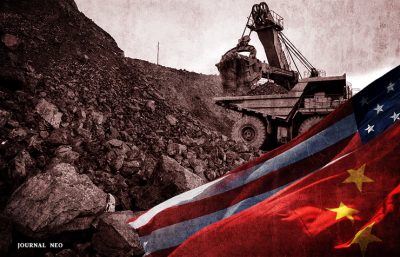Full-blown US-China Trade War? Rare Earths – US Has So Much to Lose, China Barely Feels the Loss

The United States sees the trade dispute it has with China as one of many. It’s been down this road before, with Japan, Canada, Mexico and the European Union.
China views it differently. In Beijing the trade issue is seen as a threat to its further development and a possible cause of instability. The compact between the party and the people, growth without political reform, could be damaged.
So, when the phrase, “don’t say we didn’t warn you” was used by state media last month it confirmed the gravity with which the situation is viewed from Beijing. This was not a throw-away line, though on the surface it seemed quite mild. That is until you realize the significance of it.
The six-word phrase is associated with China going to war with India in 1962 and Vietnam in 1979. It could not have been used without the highest official clearance. Beijing considers this trade dispute as a clear and present danger.
It must be stressed that war is not likely in the short term between China and the US, and the Thucydides trap, where an established power is challenged by an emerging power, is not pre-ordained. Besides, of all the causes to rally to the flag and take to the trenches, rare earths, hardly inspire thoughts of daring-do and bravery. Thousands will not take to the streets in either Beijing or Washington under banners in passionate defence of say, Lanthanum or Dysprosium. These minerals and others are, however, vital for modern lifestyles and technology and ironically, are not that rare.
The methods use to extract them are heavily polluting. It’s a dirty business. Processing one ton of rare earths produces 2,000 tons of toxic waste.
Consequently, few places mine them though they can be found in many countries.
These critical minerals, a group of 17 elements, touch almost every aspect of modern life, including renewable energy technology, spacecraft, defence, oil refinery, electronics, and the glass industry are as vital an ingredient to the global economy as oil is.
This makes China the new Saudi Arabia. It sits on close to 40 percent of rare earth resources and its 120,000 tons of annual production accounts for about 80 percent of global supply. Australia, the world’s second largest supplier, produced 20,000 metric tons last year.
To reinforce the point China’s president Xi Jinping, broke into his regular scheduling and visited a rare earth facility last month in Jiangxi province to hammer home the point.
China has options, none of them enticing. It could limit supply and move prices as Saudi Arabia and OPEC have done with oil. The backlash could spur a drive to increase rare earth mining in other countries.
The US imports 80 percent of its rare earth needs from China. But it accounts for just 4 percent of China’s rare earth shipments, totaling around $160 million in 2018. No other single commodity gives China such an advantage. Vital to the US but, in terms of quantity, of minor significance for China.
Beijing sets a quota for rare earth production twice a year. In the first half of 2019, the cap was placed at 60,000 tons – up from 45,000 the preceding half. If it is to reduce exports of rare earths, it will lower this quota. Quotas for the remainder of the year will be released in June and will be a key indicator of China’s intentions over the coming years.
One other factor comes into play. China’s “monopoly” on rare earths is illusory. Environmental regulations, more often ignored than followed, allows extraction and refinement to be cheaper and easier than other countries. But Beijing is trying to clean up its act. Domestic companies and illegal extractors have been sanctioned recently amid increasing concern about the environment.
China is also one of the leading consumers of rare earths and by 2025, the country could be a net importer of them. Driving up prices today could backfire tomorrow.
Besides, the mining of rare earths outside of China is also growing. Non-Chinese production has grown to about 29 percent of the global output from just 3 percent in 2009.
Like the Saudis, China faces a dilemma. Cut off supplies or reduce exports and markets could be threatened. Do nothing and you will seem to be a pushover. June is a sensitive time in China and in October the party will celebrate 70 years in power. Rare earths are the strongest card in Beijing’s trade hand. Will it fold or hold?
*
Note to readers: please click the share buttons below. Forward this article to your email lists. Crosspost on your blog site, internet forums. etc.
Tom Clifford is an Irish journalist based in China.

